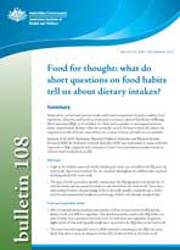Summary
Information on food and nutrient intake and trends is important for policy makers, food regulators, educators, and health professionals to promote optimal health and wellbeing. Short questions (SQs) on food habits are often used as proxies to assess good nutrition when comprehensive dietary collection methods, such as 24-hour food recalls (where the respondent recalls all foods eaten within one or more 24-hour periods) are not available.
Analysis of the 2007 Australian National Children's Nutrition and Physical Activity Survey (CSIRO & University of South Australia 2008) was undertaken to assess how well responses to SQs compared with estimates of 'usual' food and nutrient intakes based on 24-hour food recalls (food recalls).
Milk type
- Eight in 10 children reported usually drinking the same type of milk in the SQ as in the food recall. Agreement between the two methods was highest for children who reported drinking whole/full cream milk.
- The type of milk reported as usually consumed in the SQ appeared to be predictive of total fat intake and saturated fat intake as calculated from the food recall. There was a relationship between the percentage of fat in the milk usually consumed and a child's total fat and saturated fat intake as a percentage of their total dietary energy intake.
Fruit and vegetable intake
- 24% of respondents reported the same number of fruit serves in both the SQ and the dietary recall, and 26% for vegetables. Two-thirds reported a result in the SQ within one serve of what they reported in the food recall, for both fruit and vegetables. In general, higher levels of fruit and vegetable intake were reported in the SQs than in the food recall.
- The more fruit and vegetable serves a child reported consuming in the SQs, the more likely they were to have an adequate intake (AI) of dietary fibre in the food recall.
Discretionary salt use
- Responses to the SQs concerning adding salt to meals showed no relationship to children exceeding the upper level of intake (UL) for sodium or meeting the estimated average requirement (EAR) for iodine.
The SQs therefore may be a reasonable proxy for type of milk usually consumed, a reasonable approximation of fruit and vegetable intake, and of limited value for predicting sodium or iodine intakes.



